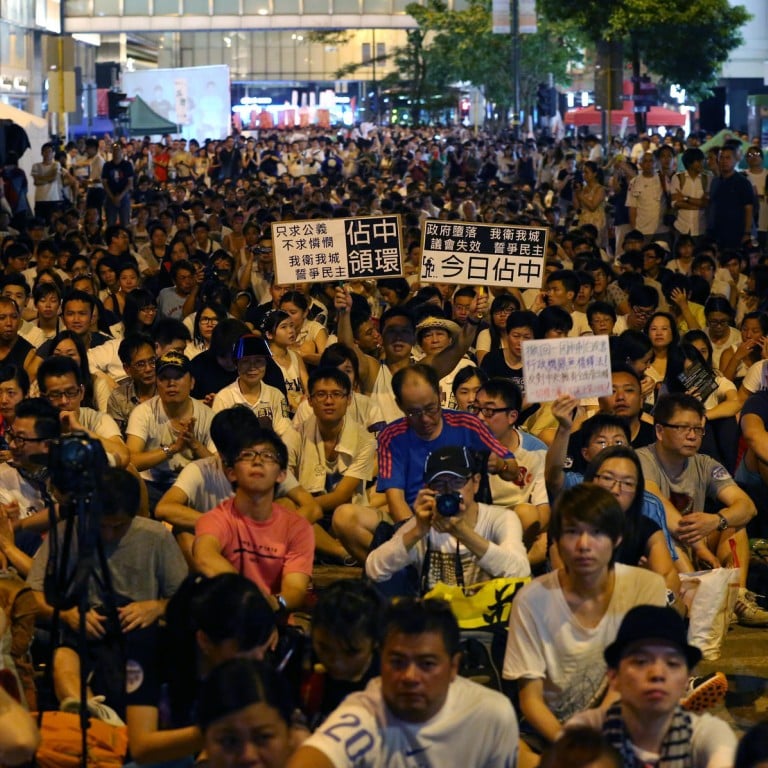
Fight against universal suffrage is all about money
HK's worst nightmare is not the relatively mild civil disobedience of Occupy, but Beijing's implicit sanction of our tycoons and their cartels
With cruelty and irony, our city's media accurately reflects the gaping divide between the oligarchs who own Hong Kong and the citizen serfs who must dwell within the walls of this city.
Every local paper either features or vilifies the Occupy insurgency and the apparent counter-insurgency being mounted against it. Then, one of our local society magazines parades a mainland family's vulgar display of wealth through a wedding in the French Riviera or a million-dollar party celebrating the first 100 days of a newborn child.
Hong Kong faces its equivalent of a constitutional crisis that will define its future. The only contributions from our government and business elites are either stern and condescending admonitions or a taunting look inside the lifestyles of the rich and famous.

Speaking in Hong Kong last week, Wang Zhenmin, a dean of Tsinghua University Law School and a former member of the Basic Law Committee who acts as an adviser to the central government, defended the plan, saying: "Less-than-perfect universal suffrage is better than no universal suffrage."
He emphasised it was important to protect the interests of the business community in the city. "They control the destiny of the economy of Hong Kong. If we ignore their interest, Hong Kong capitalism will stop."
Hong Kong has always been a practical and capitalistic society where democracy is an abstract, foreign concept because it was never available. After all, democracy is a difficult concept to define and describe in both theory and practice. But people do know when their basic rights as free people are denied or infringed upon.
Now that there is a sliver of possibility, the greatest fear of the business sector is not just populist welfare policies - Hong Kong can afford to help its poor - but the dismantling of their cartels and a challenge to their predatory business practices.
Wang described how the business sector must continue to have a voice in the nominating committee that will determine chief executive candidates.
"The business and professional sectors will constitute a minority when universal suffrage arrives. But their voices are important so we need to ensure they can still serve their main function - maintaining the city's prosperity - or else Hong Kong will face great problems," he said.
Just how Hong Kong's capitalism would cease or how its richest families would maintain stability and prosperity was not addressed.
If Wang implies that the central government thinks Hong Kong's economy would collapse when its indigenous rich class pulls out, then he should consider the avalanche of international private equity and multinational money that would eagerly replace them in every business and property sector.
This is the kind of healthy economic system that the mainland can never countenance - a freer economy with the inherent chaos of competitive markets that shows capitalism at its best. Helping to entrench dominant oligopolies drastically lowers everyone's standard of living. Hong Kong's conglomerates and property developers are inflicting excessive and concentrated economic rent seeking upon the entire economy - or even worse, fuelling social and economic unrest.
Hong Kong's worst nightmare is not the relatively mild civil disobedience of Occupy and inconvenient protests in Central. It is Beijing's implicit sanction of our tycoons and their cartels. Even the slightest migration to "one person, one vote" threatens the grip that big business holds over this economy.
While mainland agencies investigate the business practices and product quality of Microsoft Corp or H&M, Hong Kong authorities cannot require the executives and owners of local property developers and supermarket chains to testify at investigative hearings. The city's oligarchs are protected like its monarchs.
In the 21st century, it is both strange and backward that the Hong Kong government cannot subpoena business owners or executives to testify about their business practices, such as why flats are so poorly constructed or why the prices of raspberries fluctuate so much.
However, this is possible if the people could exercise their collective will through a democratically elected government. Therein lie the true opportunity and the threat of democracy.

